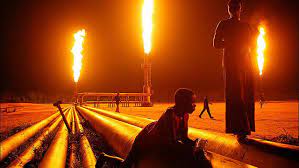The Federal Government says the utilisation of gas can help to diversify Nigeria’s energy mix and reduce the country’s dependence on oil.
It said in line with this President Muhammadu Buhari in 2021 declared 2021 to 2030 as “Nigeria’s Decade of Gas“, a period the government aspired to accelerate domestic and export gas production and utilisation.
Amb. Gabriel Aduda, Permanent Secretary, Ministry of Petroleum Resources, made this known on Thursday in Abuja at the 2023 Oloibiri Lecture Series and Energy Forum (OLEF) organised by the Society of Petroleum Engineers (SPE).
Aduda spoke on the role of the Ministry of Petroleum Resources on “Effective Gas Resources Utilisation: A Lever For Enhancing Energy Security and Achieving Net-Zero Emission Goals in Nigeria”.
He said the ministry was playing a crucial role in the effective utilisation of gas resources in Nigeria, by developing policies and regulations to encourage the use of gas, promote gas infrastructure investments and competitive gas market.
This, he said, included creating enabling environment and partnerships with the private sector to build pipelines, storage facilities and other infrastructure necessary for the transportation and storage of gas.
He said the infrastructure was essential for ensuring availability of gas, especially in expanding domestic utilisation and reducing the cost of gas by increasing competition and efficiency.
“We are already achieving very amiable results in the domestic intake of Liquefied Petroleum Gas (LPG) also known as cooking gas and Compressed Natural Gas (CNG) in several small and medium scale industries across the country.
“Another important role is supporting the development of a competitive and efficient gas market by promoting the use of market-based pricing mechanisms and encouraging the participation of multiple players in the market.
“A competitive market can help to ensure that gas is priced efficiently, which in turn can help to encourage its use.
“Finally, the ministry is further playing a crucial role with the passage of the PIA 2021 in developing policies and regulations that encourage the use of gas in its various forms,” he said.
He said globally there were efforts towards the creation of an international market for fossil energy that could minimise gas flaring, methane and CO2 emissions across the value chain to the fullest extent practicable.
“Nigeria became the first African country to regulate methane emissions from its oil and gas sector in 2022.
“Achieving the Global Methane Pledge (GMP) goal of cutting anthropogenic methane emissions by 30 percent by 2030 will drive significant energy security, food security, health and several other development gains.
“The enactment of the Petroleum Industry Act (PIA) 2021 has led to the creation of regulatory frameworks with clear-cut mandates for the growth and development of the oil and gas sector.
“If properly implemented, it would represent the gold standard of natural resource management, with clear and separate roles for the subsectors of the industry.
“It also creates the Midstream Gas Infrastructure Fund (MGIF) for the purpose of supporting investments in the development of gas infrastructure, which includes pipelines, storage facilities, and processing plants, to facilitate the transportation and storage of gas.
Gas is a cleaner-burning fossil fuel than oil or coal and can play a significant role in reducing greenhouse gas emissions.
It is also essential to promote public awareness and education on the benefits of gas as a cleaner and more affordable source of energy.
“This will require targeted outreach and engagement with communities, as well as the development of programmes that provide affordable access to clean energy for households and small businesses. (NAN)



